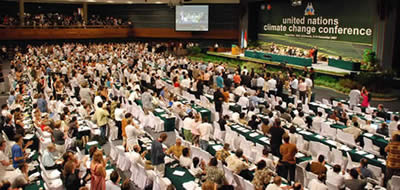Background

One of the major international environmental and political challenges of our time is the climate change. It has been known for some time now, but for economic reasons it has been very difficult to find shared stand on what to do and how to do it. The 1997 Kyoto Protocol, which entered into force in 2005, is the first legally binding climate change solution that the international community has been able to agree upon.
The major feature of the Kyoto Protocol are the targets for 37 industrialized countries and the European Community for reducing greenhouse gas emissions. In addition to the limits, the Kyoto Protocol introduces three mechanisms how the targets are to be met. Primarily, the countries were to reduce the emissions through national measures, meaning that they were to take action to actually diminish their greenhouse gas pollution. But since the economies of most countries are highly dependent on industries that are high polluters, three other mechanisms were introduced to ease the reduction scheme.
The industrialized countries were given opportunity to trade emission units they themselves did not use, earn emission credits by implementing an emission-reduction project in developing countries or earn emission reduction units from a joint investment on emission-reduction or emission removal project in another industrialized country.
Major Post-Kyoto Challenges
All has come to nothing the fact being that almost all the industrialized countries that have ratified the Kyoto protocol are far from their targets for 2012. Another, and perhaps even more severe, drawback is that the biggest polluters in the world, the USA, China and India, either did not ratify the Protocol or were not categorized as industrialized countries under the Protocol thus not being under any emission reduction scheme.

The Bali Road Map, adopted in the 13th Conference of Parties (COP) in 2007 in Bali, Indonesia includes the Bali Action Plan, which charted the course for a new negotiation process designed to create a climate change solution package for post-Kyoto era. The Bali Action Plan identified the COP 15, the upcoming Copenhagen UN Climate change Conference as the major event, where a new legally binding post-Kyoto agreement is to be enacted.
One of the major challenges for the Copenhagen Conference has been the engagement of the world's biggest leaders. Despite the very good ratification situation, the Kyoto Protocol fails to address some of the major problems of today, namely the emergence of new industrialized powers. China has already announced that it aims at cutting its carbon emissions by up to 45 percent as measured against its economic output – a target aimed at keeping its surging growth while still reining in pollution, while India has not clearly expressed its will to cut emissions, but only to accept "deviation from business as usual". The US, which never ratified the Kyoto Protocol has as well already announced that it is going to reduce its greenhouse gas emissions by 17%.
Now at the eve of the Conference many significant countries have announced their willingness to sign a binding treaty on emission reduction. The Commonwealth, a 53-member state union, has stated that a deal should be adopted no later than next year and 10 billion US dollars should be made available to help developing countries to reach their emission goals.
The COP15 negotiations start on Monday, December 7 and will be carried out throughout the two week period closing session being on Friday, December 18. In addition to the actual COP15, 5th Session of the Conference of the Parties serving as the meeting of the Parties to the Kyoto Protocol (CMP 5) will also be held in Copenhagen at the same dates. Further, 31st Session of the Subsidiary Body for Scientific and Technological Advice (SBSTA 31), 31st Session of the Subsidiary Body for Implementation (SBI 31), 10th session of the Ad Hoc Working Group on Further Commitments for Annex I Parties under the Kyoto Protocol (AWG-KP 10) and 8th session of the Ad Hoc Working Group on Long-term Cooperative Action (AWG-LCA 8) will takes place in Copenhagen between the December 7 and December 18.
For more information and for latest news, please visit the COP15 homepage
[http://www.youtube.com/watch?v=r3x4OnMPeCs]
